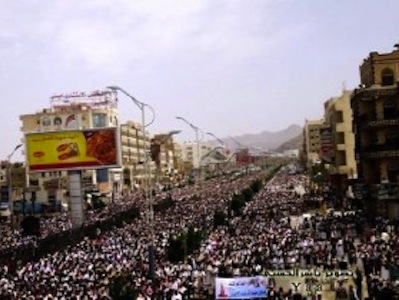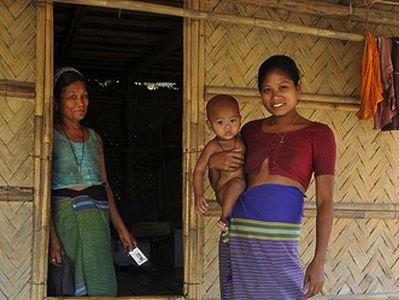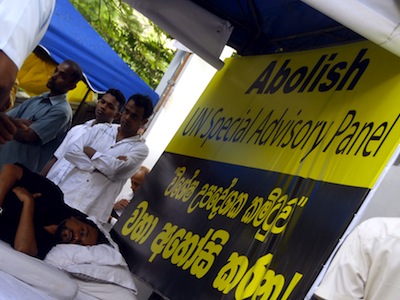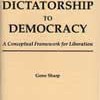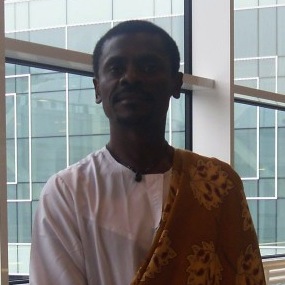Stories about Protest from April, 2011
Yemen: Millions Protest on Last Chance Friday
Millions of protesters thronged the squares of Sanaa and Taiz in Yemen, calling for the end of Ali Abdulla Saleh's regime. Dubbed Last Chance Friday, protesters are keen to boot out Saleh, who has ruled the country for 32 years. The whole week saw support pumped up for today's massive protests, which didn't fail the expectations of observers.
Syria: The People Want to Overthrow the Regime
Syria is heating up this Friday, with news of fresh protests in many provinces, and more violence as the regime tries to crackdown on the unrest, which started on March 15. Netizens keep us updated on Twitter and YouTube.
China: Massive Strike by Truck Drivers at Shanghai Ports
Kenneth Tan from Shanghaiist posts photos and reports on the massive strike by truck drivers against rising fuel prices and higher handling fees charged by Shanghai ports.
Bangladesh: Netizens Protest Human Rights Abuse in the Hills
Ethnic violence has sparked again in the Chittagong Hill Tracts of Bangladesh between Bengali settlers and indigenous people due to land disputes. The mainstream media have been accused of highlighting the Bengali casualties only and are ignoring the plights of the local aboriginal people. But this time around these minorities have found a voice via blogs and Facebook.
Azerbaijan: Protest to demand journalist's release
Mark Grigorian [RU] posts photographs of today's protest demonstration outside the Azerbaijani Embassy in London in support of imprisoned journalist and Amnesty International prisoner of conscience Eynulla Fatullayev. Marking the forth anniversary since his arrest, the blog notes that when the European Court of Human Rights ruled that he was...
South Korea: Search Engine Censorship Claims
As South Korea's biggest search engines file an anti-competition charge against Google, net users have started to look back at the various companies' contributions to the Korean net environment. The nation's most visited portal, Naver, has come under particular fire for alleged news screening and censorship of information, along with its monopoly in the field.
Syria: Homs Protests Attract Thousands (Video)
Despite the security crackdown, protests are continuing in Syria, with countless of videos surfacing online showing thousands of protesters calling for the overthrow of the Assad regime. Here is a selection of videos from Homs.
Cuba: The More Things “Change”
Uncommon Sense finds recent announcements about reform in Cuba ironic in the context of developments like these.
Sri Lanka: UN Panel Report Causes An Uproar
An United Nations (UN) advisory panel, led by former Indonesian Atty. Gen. Marzuki Darusman, has submitted a report to the UN Secretary-General Ban Ki-moon, in which they find credible evidence that the Sri Lankan military shelled civilians in no-fire zones and sought to silence critics in a brutal fashion, during the war against guerilla group Liberation Tigers of Tamil Eelam (LTTE) in 2009.
Syria: Emergency Law Lifted as Protests Continue
There were mixed feelings in Syria today as President Bashar Al-Assad announced an end to the emergency law that has been in place in the country since 1963. The country has seen weeks of protests, many of which have been met with deadly force from security officials.
Uganda: Government Attempts to Block Facebook, Twitter as Protests Continue
As opposition politicians and others angry over rising fuel and food prices in Uganda continue to stage "walk to work" protests against the current regime, the government is asking Internet service providers (ISPs) to shut down access to Facebook and Twitter.
Azerbaijan: The ‘Terror’ of Tiny Town
Tamada Tales comments on the detention of a small child and her mother at an opposition protest in Baku on Sunday. Captured on video uploaded to YouTube and shared online, the blog wonders what ‘havoc’ could possible be wreaked upon the Azerbaijani capital by the girl.
Ukraine: Kyiv Post Editorial Staff on Strike
Democratist writes about the situation with Kyiv Post, an English-language newspaper whose staff went on strike last week to protest the publisher's decision to fire the editor-in-chief over the publication of an interview with the Ukrainian minister of agriculture.
Bangladesh: Approval Of A Coal Mine Threatens Displacement And Destruction
ShahidulNews reports that “a massively destructive coal mine could be approved in northwest Bangladesh that would displace tens of thousands of families, destroy vital farmland, and devastate mangrove forests that protect the climate-fragile country from rising sea levels”.
Kuwait: The Prime Minister Wins Again
Sheikh Nasser Al-Mohammed Al-Sabah has broken a new record with his appointment as prime minister of Kuwait for the seventh time in five years. Some bloggers and Twitter users have been campaigning, alongside political groups, demanding his departure. Kuwaiti bloggers speak up, discussing why they need a new prime minister to steer their country forward.
Iran: Top Fashion designer and Green Movement
Tahriyeh Khamosh has published a video where Bijan Pakzad, top fashion designer who passed away this weekend, talks about his participation in a demonstration. The blogger says the film is a “proof he was green”.
India: Social Media Powers Anti Corruption Bill Campaign
On April 5, 2011, social activist Anna Hazare started a fast-unto-death campaign to demand an effective anti-corruption law and hundreds of thousands of Indians supported him. Social media helped spread the campaign of Anna Hazare; netizens analyze why the campaign will never tip into a social movement.
Egypt: “I really sympathize with Mubarak”
Hany George, an Egyptian blogger and activist shares a true story from Tahrir Square that he dedicates to all the people who still sympathize with ousted president Hosni Mubarak as he is detained and prosecuted in Egypt.
Russia: Art Group “Voina” and Innovation 2010 Prize
RussiaWatchers writes in detail about Art Group Voina, whose “phallus on the Liteiny bridge opposite to St. Petersburg FSB headquarters has been awarded the Innovation 2010 prize for best visual work of art.”
Egypt: Gene Sharp Taught Us How To Revolt!
Last February, The New York Times wrote an article about the political science professor, Gene Sharp, whose ideas were credited as being an inspiration for the Egyptian revolution, as well as many other uprisings in the region. Egyptian netizens respond to the claim with the hashtag on Twitter.
Equatorial Guinea: Few, but Strong Virtual Voices
In Equatorial Guinea, where only 2% of the population has access to the Internet, and there are about 11,000 Facebook users and two known blogs. Juan Tomás Ávila Laurel and Eyi Nguema are the only bloggers writing in Equatorial Guinea. For them, blogging is a true commitment with democracy.

